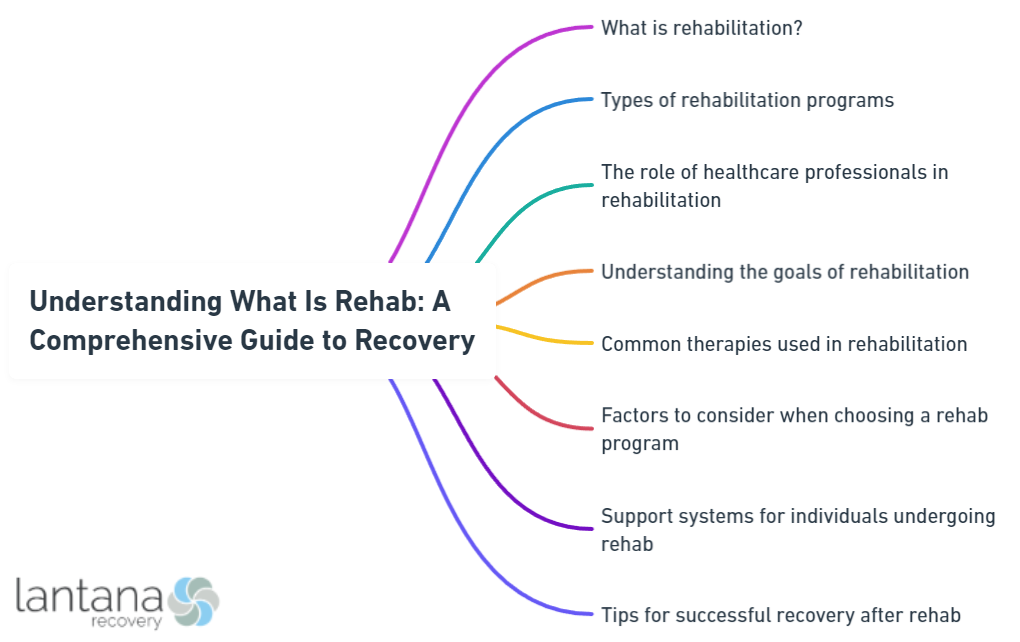Rehab, or “what is rehab,” is a lifeline for many, providing structured treatment to overcome addiction or manage disabilities stemming from injury or illness. It combines medical interventions with psychological support tailored to the individual’s unique challenges. This concise guide explains the core aspects of rehab—its purposes, settings, and treatment phases—preparing you for a clearer understanding of the recovery process.
Key Takeaways
- Rehabilitation, commonly known as rehab, is a structured treatment program aimed at individuals recovering from addiction or disability, focusing on sobriety and quality of life improvement using medical treatment and psychotherapy, tailored to individual needs.
- Rehab settings vary between inpatient (residential) and outpatient services, with the former providing 24/7 care for severe addictions and the latter allowing for daily life activities continuity; both use a range of therapies including medical detox, cognitive behavioral therapy, and holistic approaches.
- Rehabilitation is a phased process involving initial assessment and treatment planning, active treatment with skills and coping strategies development, and continuing care that includes aftercare support to maintain recovery and prevent relapse.
Defining Rehab and Its Purpose
Rehabilitation, often called rehab, serves as a treatment program helping individuals struggling with addiction or those who have lost crucial daily life abilities because of disease, injury, or treatment side effects. Initiating a lifelong commitment to sobriety and enhancing the affected individuals’ quality of life are the main objectives of rehab. It is a structured process, typically utilizing a blend of medical treatment and psychotherapy, tailored to the individual’s needs.
The objective of rehab programs is to:
- Create a stress-free environment where professionals administer intensive treatment
- Tackle the core reasons behind drug dependence, alongside detoxification efforts
- Equip individuals with skills to enable long-term recovery and prevent relapse
The process often takes place in diverse settings, from healthcare facilities to home, with potential support from family or friends.
Exploring Different Rehab Settings

Rehab settings are diverse and are generally categorized into two main types: inpatient and outpatient. Inpatient rehabilitation facilities, also known as residential treatment centers, require individuals to reside full-time in the facility, while outpatient rehab allows patients to return home after daily treatments.
Individuals often choose between inpatient and outpatient settings based on their specific needs and circumstances.
The Residential Treatment Experience
Residential, or inpatient rehab, provides a highly structured environment that operates round-the-clock, making it suitable for addressing severe addictions. In this setting, residents engage in daily planned activities such as yoga, meditation, or exercise, followed by group sessions focusing on addiction and recovery. The afternoons are dedicated to various therapeutic sessions integral to the treatment process.
Specialized programs for specific groups like adolescents, women, or veterans are often provided by residential treatment centers, including drug and alcohol rehab treatment. After completing the residential treatment, sober living homes are available to serve as a transitional drug and alcohol-free environment, reinforcing the commitment to a drug-free lifestyle.

Outpatient Addiction Treatment Dynamics
For individuals wishing to maintain their daily activities like work and family responsibilities while undergoing treatment, outpatient rehab services serve as an alternative. Comprehensive outpatient treatment includes detoxification, rehabilitation, and continuing care phases, utilizing evidence-based practices and structured programs such as group and individual therapy and skills development.
Though generally more economical than inpatient rehab, outpatient programs don’t compromise in offering essential supportive services and in fostering a sense of personal empowerment amongst participants. These programs can also serve as a step-down level of care after inpatient treatment, providing a supportive environment that enables gradual adjustment back into day-to-day life.
Alcohol Rehab South Carolina
If you or a loved one are struggling with alcohol addiction in South Carolina, seeking professional help from an alcohol rehab center is crucial. Fortunately, South Carolina offers a range of rehabilitation facilities equipped to provide comprehensive care and support for individuals battling alcoholism. These facilities often employ a combination of therapies, including counseling, group support, and medical interventions tailored to each person’s needs. By entering an alcohol rehab program in South Carolina, individuals gain access to the necessary tools and resources to address their addiction and embark on the path to recovery. With the guidance of experienced professionals and a supportive community, individuals can overcome the challenges of alcohol addiction and reclaim control over their lives.
Unpacking Treatment Programs and Methods

A range of treatment methods, each designed to tackle a unique aspect of addiction, are utilized by addiction treatment programmes, also known as rehab programs. These methods include:
- Medical detox
- Cognitive behavioral therapy
- Group sessions
- Holistic approaches
All of these methods are aimed at tackling the physical, emotional, and psychological facets of drug or alcohol addiction.
Medical Detox and Managing Withdrawal
A key component of the rehab process is medical detox, also known as ‘medically managed withdrawal’. It involves the use of medical interventions to safely manage the side effects of drug cessation, with the primary aim of:
- Stabilizing patients medically
- Mitigating withdrawal symptoms
- Safeguarding against harmful withdrawal effects
- Facilitating the transition to subsequent treatment
This process typically spans about a week, however, the duration can differ based on the type of substance and the extent of dependency.
Common withdrawal symptoms during drug detox include:
- Mood changes
- Anxiety
- Flu-like symptoms
- Shaking
- Intense cravings
Detox professionals manage these symptoms using medications in a controlled setting. Tapering strategies are often used for substances like benzos, alcohol, and opioids to gradually wean a person off the drugs, reducing the intensity of withdrawal.
Cognitive Behavioral Therapy and Group Sessions
Used commonly in rehab, Cognitive Behavioral Therapy (CBT) focuses on:
- Correcting problematic behaviors
- Anticipating relapse triggers
- Identifying and modifying negative thinking patterns and behaviors
- Teaching strategies for dealing with stress
- Preventing relapse
CBT assists individuals in addressing these areas and helps them in their recovery journey.
Group therapy provides a supportive environment in rehab where participants can share experiences, engage in role-playing or experiential exercises, and develop social skills that aid in recovery. The group setting fosters camaraderie, allowing individuals to connect with peers in similar circumstances, reducing feelings of isolation, and encouraging powerful conversations about recovery.
Holistic Approaches: From Art Therapy to Physical Medicine
To support overall well-being and recovery, holistic approaches in rehab supplement traditional treatments. These approaches include art therapy, music therapy, and experiential therapies, which facilitate creative self-expression and emotional healing. Therapies in group settings, such as art, music, and recreational therapy, address mental health in a community framework, helping individuals cope with emotional challenges without substance use.
Mindfulness and meditation are also integrated into holistic treatment approaches to increase awareness and develop healthy coping mechanisms during addiction recovery. Physical therapy is another crucial component, focusing on stages such as repair, strength, and function, to help individuals regain movement and mobility, restore muscle strength and endurance, and minimize future injury risks.
What is Alcohol Dependence
Alcohol dependence, commonly known as alcoholism, is a chronic disorder characterized by a strong craving for alcohol, inability to control drinking, tolerance to its effects, and withdrawal symptoms when not drinking. It’s a complex condition influenced by genetic, psychological, and environmental factors. Individuals with alcohol dependence often prioritize drinking over other responsibilities, leading to negative consequences in personal, social, and professional aspects of life. Over time, the brain adapts to regular alcohol consumption, leading to changes in brain chemistry and function, reinforcing the cycle of dependence. Treatment for alcohol dependence typically involves a combination of therapy, support groups, and sometimes medication to manage withdrawal symptoms and cravings.
The Phases of Rehabilitation

In the recovery journey, rehabilitation follows a three-stage process where each stage plays a pivotal role. The stages include:
- Initial assessment and customized treatment planning
- Active treatment with practical skills and coping strategies development
- Continuing care with aftercare and long-term recovery support
Initial Phase: Assessment and Customized Treatment Plan
In the initial phase of rehab, an addiction professional carries out a comprehensive assessment to determine the suitable treatment program and establish individual goals and outcomes. The assessment evaluates the client’s social, educational, psychological, and physiological functioning, as well as their potential for change, learning style, suitable education programs, job skills, and community supports.
The assessment process in rehab should be therapeutic, aiding clients in understanding their past and present, and the tasks required for goal attainment. The five-step problem-solving model used in the assessment process includes the following steps:
- Problem orientation
- Problem identification
- Generation of alternatives
- Decision-making
- Verification
Active Treatment: Developing Practical Skills and Coping Strategies
During the crucial phase of active treatment in the rehab process, individuals engage in daily meetings, therapy sessions, and skill development to tackle addiction and prevent relapse. Patients are equipped with practical skills and coping strategies that identify behavior patterns and triggers, apply learned skills to daily life, and use various program approaches such as cognitive behavioral therapy and group discussions.
Throughout the active treatment phase, patients’ treatment plans are continuously monitored and adjusted to ensure they remain effective in addressing individual progress and needs. Therapy sessions, both individual and group, form a core part of the treatment schedules during active treatment, supporting the development of patients’ coping mechanisms.
Continuing Care: Aftercare and Long-Term Recovery Support
Emphasizing the importance of aftercare and long-term support to maintain recovery and prevent relapse after leaving rehab, continuing care marks the final stage of rehab. Aftercare is the ongoing care received after leaving rehab, which includes 12-step meetings, outpatient care, counseling, and sober living arrangements. An aftercare plan consists of various activities, interventions, and resources such as outpatient counseling, therapies, alumni programs, and sober living homes to help individuals cope with triggers, stress, and cravings after treatment.
Ongoing involvement in aftercare is suggested for a minimum of one year to mitigate the heightened risk of relapse in the months following rehab, with adolescents potentially requiring an extended period of follow-up care. Mental health professionals collaborate with rehab participants to manage potential relapses through added support and by investigating factors contributing to the relapse, indicating the adaptive nature of aftercare support.
The Role of Medical and Mental Health Services in Rehab

For a holistic approach to treatment, integrated medical and mental health services in rehab involve the collaboration of medical professionals, addiction specialists, and therapists. This comprehensive care addresses both addiction and concurrent medical conditions such as heart or liver disease and mental health disorders. Studies have shown that rehab facilities providing comprehensive care with medical services have improved abstinence rates among patients.
Having medical services on-site in rehab centers facilitates quicker access to care, reducing delays and potentially improving recovery outcomes. Complementing these services, holistic treatments such as:
- stress and anxiety reduction techniques
- mindfulness and meditation practices
- yoga and exercise programs
- art therapy and music therapy
Supporting long-term recovery is crucial, and the inclusion of mental health services is essential, as a significant number of individuals with substance abuse issues also experience mental health disorders such as depression, anxiety, or PTSD.
Tailoring Rehab to Individual Needs
Considering factors like addiction history, personal responsibilities, and specific treatment requirements, rehab programs are tailored to individual needs. The programs are designed to ensure they can be integrated with the patient’s existing responsibilities, including work, school, and family duties.
Family involvement in therapy can enhance understanding and support, fostering better recovery outcomes by addressing the relationship between addiction and family dynamics. For comprehensive support, rehab centers provide additional services such as:
- Mental health programs
- Relapse prevention
- Educational classes
- Financial assistance
- Medication services
- Transportation options
These services help reduce triggers and stressors from daily life.
Rehab Success Factors: Environment and Support
The presence of a supportive environment and family involvement largely influence successful recovery from addiction in rehab. The rehab programs incorporate various family therapy approaches, which are critical to addressing family dynamics and supporting the individual’s recovery. A supportive environment in rehab enhances treatment effectiveness and helps individuals stay focused on recovery, minimizing premature program departure.
Recovery settings should offer safety, minimal stress, and an engaging environment to protect individuals during vulnerable stages of detox and treatment. Post-rehab support from family and friends, as well as participation in self-help fellowships, provides an essential network for fostering healthy habits and sustaining recovery.
Who Can Prescribe Methadone
“Who can prescribe methadone” is a critical question in the realm of addiction treatment. In many countries, regulations dictate that only licensed medical professionals, such as physicians, nurse practitioners, and physician assistants, are authorized to prescribe methadone. These professionals typically undergo specialized training and obtain certification to prescribe medications for opioid use disorder (OUD), including methadone. Additionally, regulations may vary depending on the setting in which the medication is prescribed, such as outpatient clinics, hospitals, or addiction treatment centers. It’s essential for healthcare providers to adhere strictly to legal and ethical guidelines when prescribing methadone to ensure patient safety and effective treatment of OUD. Collaborative efforts between healthcare professionals, addiction specialists, and regulatory bodies are crucial for maintaining the integrity of methadone treatment programs and preventing misuse or diversion of this potent medication.
Navigating the Costs and Duration of Rehab Programs
Factors like facility location, length of stay, and services provided can significantly influence the costs and duration of rehab programs. Despite higher costs for inpatient rehab due to 24/7 staff and amenities, the long-term savings from overcoming addiction often outweigh the initial expense. The average stay in residential treatment programs is typically 30 days but can extend to 60 or 90 days for more severe addictions, affecting overall costs.
Insurance providers, including:
- Blue Cross Blue Shield
- Aetna
- Anthem
- Cigna
- Humana
may cover parts of rehab costs, while Medicaid programs can offer further assistance. For those without insurance, there are funding options available, such as state-funded programs, payment plans, and scholarships, to help mitigate rehab expenses. The long-term financial benefits of rehab can be considerable, including not only substance-related savings but also improvements in work productivity, and reductions in legal and accident-related costs.
Summary
Understanding the complex process of rehab is essential for anyone embarking on the journey of recovery. From defining rehab and exploring different settings, to unpacking treatment methods and the phases of rehabilitation, we’ve taken a comprehensive look at this crucial process. We’ve also delved into the role of medical and mental health services, the importance of tailoring rehab to individual needs, and the significant factors that contribute to rehab success. Lastly, we’ve navigated the costs and duration of rehab programs, providing insights into financial assistance and insurance coverage options. The path to recovery may not be easy, but with the right guidance and support, it is undeniably achievable.
Frequently Asked Questions
What is the difference between rehab and therapy?
Rehabilitation focuses on recovering from injury or illness, assisting with regaining strength and mobility. Physical therapy is a hands-on approach utilizing exercises and treatments to improve strength, flexibility, and range of motion.
What is an example of a rehab?
An example of rehab is speech therapy for improving communication and swallowing difficulties, or cognitive rehabilitation for enhancing memory and thinking skills. Both are important parts of the rehab process.
What is called rehab?
Rehabilitation, often referred to as “rehab,” is a comprehensive program designed to help individuals overcome addiction or recover from medical conditions, providing them with the necessary resources to lead a healthy life. It may involve interventions to optimize functioning and reduce disability in individuals.
What does it mean when you are rehab?
When someone is in rehab, it means they are undergoing treatment for drug or alcohol addiction, which can involve medical treatment and psychotherapy. Over 20 million people needed substance abuse treatment in 2015 according to the Substance Abuse and Mental Health Services Administration.
What is the purpose of rehab?
The purpose of rehab is to initiate a lifelong commitment to sobriety and enhance the quality of life for those affected by addiction or conditions that impair daily life abilities. It aims to help individuals regain control and improve their overall well-being.









